Administrative relations between the Central government and the States in India are guided by constitutional provisions designed to ensure effective governance and coordination. These include mechanisms for resolving disputes, fostering cooperation, and managing shared resources. Key aspects include the role of All-India Services, public service commissions, and a unified judicial system. This framework supports balanced and efficient administration across the country.
Cooperation and Coordination in Administrative Federalism: Mechanisms, Challenges, and Positive Changes
Cooperation Between the Centre and States
The Indian Constitution incorporates several provisions to foster cooperation and coordination between the Central government and the States:
- Inter-State River Disputes
- Authority on Inter-State River Disputes: The Parliament has the authority to establish mechanisms for adjudicating disputes or complaints arising from the use, distribution, and control of waters of inter-State rivers and river valleys.
- Equitable Management: This provision ensures equitable management of water resources shared by multiple States.
- Inter-State Council
- Establishment of Inter-State Council: Article 263 empowers the President to establish an Inter-State Council to investigate and discuss subjects of common interest between the Centre and the States.
- Platform for Dialogue and Collaboration: This council, established in 1990, serves as a platform for dialogue and collaboration on issues of mutual concern.
- Full Faith and Credit Claus: Public acts, records, and judicial proceedings of the Centre and every State are accorded full faith and credit throughout the territory of India.
- Promotion of Mutual Recognition: This provision promotes mutual recognition and acceptance of official documents and legal processes across the country.
- Inter-State Freedom of Trade, Commerce, and Intercourse
- Parliament’s Authority: The Parliament has the power to appoint an appropriate authority to enforce the constitutional provisions guaranteeing inter-State freedom of trade, commerce, and intercourse.
- Importance of Seamless Movement: While no such authority has been established yet, the provision highlights the importance of seamless movement of goods, services, and people across State borders.
- Commitment to Harmony and Collaboration: These constitutional provisions underscore the commitment to foster a harmonious and collaborative relationship between the Centre and the States, ensuring that the nation’s resources and opportunities are managed effectively for the collective benefit of all citizens.
Enroll now for UPSC Online Course
All-India Services
Distinct Public Services: The Indian administrative structure, like any other federation, comprises distinct public services for the Centre, known as Central Services, and for individual States, known as State Services.
- All-India Services: Additionally, there exist All-India Services—the Indian Administrative Service (IAS), the Indian Police Service (IPS), and the Indian Forest Service (IFS).
- Recruitment and Control of All-India Services: Members of these All-India Services hold key positions in both the Centre and the States, serving both entities by turn.
- However, their recruitment and training are handled by the Centre.
- These All-India Services are subject to joint control by the Central government and their State counterparts.
- While the Central government holds ultimate control, the immediate control rests with the State governments.
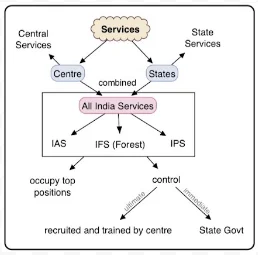
- Evolution and Constitutional Provision: In 1947, the Indian Civil Service (ICS) was replaced by the IAS, and the Indian Police (IP) was replaced by the IPS, both being recognized as All-India Services by the Constitution.
- In 1966, the Indian Forest Service (IFS) was established as the third All-India Service.
- Creation of New All-India Services: Article 312 of the Constitution empowers the Parliament to create new All-India Services upon a resolution to that effect passed by the Rajya Sabha.
- Uniformity Across States: Irrespective of their distribution among different States, each of these three All-India Services forms a single service with common rights, status, and uniform pay scales throughout the country.
- Justification of All-India Services: While the All-India Services, by restricting the autonomy and patronage of the States, appear to contravene the principle of federalism enshrined in the Constitution, their existence is justified on the grounds that:
- High Administrative Standards: They contribute to maintaining high standards of administration in both the Centre as well as the States.
- Uniformity in Administration: They help ensure uniformity in the administrative system across the country.
- Coordination and Cooperation: They facilitate liaison, cooperation, coordination, and joint action on issues of common interest between the Centre and the States.
Public Service Commissions
The relationship between the Centre and the States in the domain of public service commissions is characterized by the following points:
- Appointment and Removal of State Public Service Commission Members
- The Governor of a State appoints the Chairman and members of a State public service commission, but only the President can remove them from office.
- Establishment of Joint State Public Service Commissions
- At the request of the concerned State legislatures, the Parliament can establish a Joint State Public Service Commission (JSPSC) to serve two or more States.
- The President appoints the chairman and members of the JSPSC.
- UPSC’s Assistance to States
- Upon request from the Governor of a State and with the approval of the President, the Union Public Service Commission (UPSC) can assist the State in meeting its recruitment needs.
- UPSC’s Assistance in Joint Recruitment Schemes
- When requested by two or more States, the UPSC assists them in developing and implementing joint recruitment schemes for any services requiring candidates with specialised qualifications.
Integrated Judicial System
Unified Judicial System in India: Despite India’s dual polity, characterised by the division of power between the Central government and the States, the country does not adhere to a dual system of administering justice.
- Instead, the Constitution establishes a unified judicial system with the Supreme Court at the apex and the State high courts below it.
- This single system of courts enforces both Central laws and State laws, ensuring uniformity and consistency in the application of legal principles.
- Authority of High Court Judges: The judges of a State high court are appointed by the President in consultation with the Chief Justice of India and the Governor of the State.
-
- The President also holds the authority to transfer and remove high court judges.
- Common High Courts for Multiple States: To address the needs of multiple States, the Parliament can establish a common high court to serve two or more States.
- Example: Maharashtra and Goa share a common high court, as do Punjab and Haryana.
- Upholding the Rule of Law: This unified judicial system plays a crucial role in upholding the rule of law, ensuring that the rights and liberties of citizens are protected regardless of their location or the legal issue at hand.
- It also promotes national unity by fostering a common understanding and application of legal principles across the country.
Relations During Emergencies
- National Emergency (Article 352)
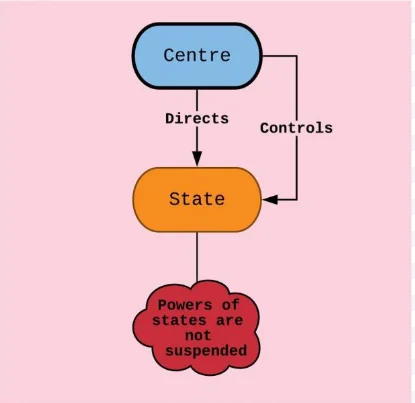
-
- Executive Directives to States: During a national emergency proclaimed under Article 352, the Centre gains the authority to issue executive directives to any State on any matter.
- Central Control: This essentially grants the Central government comprehensive control over State governments, without suspending their operations.
- President’s Rule (Article 356)
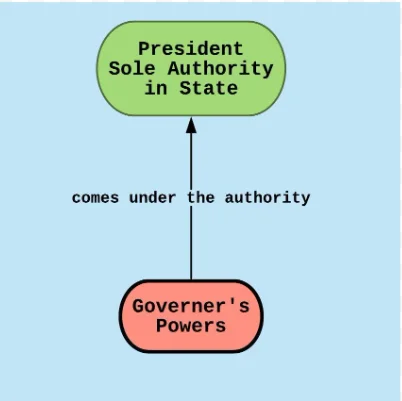
-
- Assumption of State Functions: When President’s Rule is imposed in a State under Article 356, the President can assume the functions of the State government and the powers vested in the Governor or any other executive authority in the State.
- Direct Central Control: This effectively places the State administration under direct Central control.
- Financial Emergency (Article 360)
- Directive Powers of the Central Government: During a financial emergency declared under Article 360, the Central government can direct States to adhere to principles of financial propriety and issue other necessary directives, including the reduction of salaries for State officials.
- Ensuring Financial Stability and Alignment: This ensures that States maintain financial stability and align their financial practices with national economic goals.
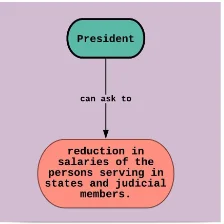
Other Provisions
Article 355: Protection of States against External Aggression and Internal Disturbance
- Article 355 imposes two primary duties on the Central government:
- Protection from External Aggression: The Central government is responsible for safeguarding every State against external threats, such as war or foreign invasion.
- This involves maintaining a strong military and diplomatic presence to deter and repel aggression.
- Protection from External Aggression: The Central government is responsible for safeguarding every State against external threats, such as war or foreign invasion.
- Ensuring Constitutional Governance: The Central government has the obligation to ensure that the government of each State functions in accordance with the provisions of the Constitution.
- This includes upholding constitutional principles, preventing misuse of power, and maintaining law and order.
Governor as an Agent of the Centre
- Governor’s Dual Role: The Governor of a State, appointed by the President, serves as a crucial link between the Central government and the State administration.
- While acting as the constitutional head of the State, the Governor also plays a dual role as an agent of the Centre.
- Reporting to the Centre: The Governor regularly submits reports to the Central government on the administrative affairs of the State, keeping the Centre informed about the State’s activities and potential issues.
- Acting on Central Directives: The Governor can be called upon by the President to issue ordinances or take other actions to ensure compliance with Central laws or directives.
- This allows the Centre to exert influence over the State administration when necessary.
Appointment and Removal of State Election Commissioner (Article 243K)
- Appointment: The State Election Commissioner is appointed by the Governor of the State but can only be removed by the President in the manner similar to the removal of a High Court judge.
- Ensuring Free and Fair Elections: This arrangement ensures that the conduct of elections of Panchayats and Municipalities in a State remains free and fair.
Extra Constitutional Mechanisms
In addition to the constitutional mechanisms that facilitate cooperation and coordination between the Central government and the States, there exist a number of extra-constitutional devices that serve this purpose.
- These devices include various advisory bodies and conferences held at the Central level.
Extra-Constitutional Advisory Bodies
Platforms for Consultation and Exchange: These non-constitutional advisory bodies serve as platforms for consultation and exchange of ideas between the Central government and the States.
- Forum for Common Issues: They provide a forum for discussing issues of common interest and developing strategies for addressing them.
Some of the key extra-constitutional advisory bodies include:
- NITI Ayog (National Institution for Transforming India): This body replaced the Planning Commission and is tasked with providing strategic and technical advice to the Central government and the States on various socio-economic issues.
- National Integration Council: This council aims to promote national unity and integration by fostering understanding and cooperation among people of different religions, castes, and regions.
- Central Council of Health and Family Welfare: This council assists in formulating and coordinating policies related to public health and family welfare.
- Central Council of Local Government: This council provides a platform for discussion and collaboration on issues related to urban and rural local governance.
- Zonal Councils: These councils facilitate coordination among States within a particular region.
- North-Eastern Council: This council focuses on the specific developmental needs of the North-Eastern States.
- Central Council of Indian Medicine: This council promotes and regulates the practice of Indian medicine (Ayurveda).
- Central Council of Homoeopathy: This council promotes and regulates the practice of homoeopathy.
- Transport Development Council: This council advises the Central government on matters related to transport policy and development.
- University Grants Commission (UGC): This statutory body provides financial assistance and maintains standards of higher education in India.
Conferences
Regular Opportunities for Discussion: These conferences provide regular opportunities for the Central government and the States to discuss and address important issues.
- Wide Range of Topics Covered: They cover a wide range of topics, including law, education, health, and security.
- Some Of The Key Conferences Include:
- Governors’ Conference: The President presides over this conference, which brings together Governors from all States.
- Chief Ministers’ Conference: The Prime Minister presides over this conference, which brings together chief ministers from all States.
- Chief Secretaries’ Conference: The Cabinet Secretary presides over this conference, which brings together chief secretaries from all States.
- Conference of Inspectors-General of Police: This conference brings together the highest-ranking police officers from all States to discuss issues related to law and order.
- Chief Justices’ Conference: The Chief Justice of India presides over this conference, which brings together chief justices of all high courts.
- Conference of Vice-Chancellors: This conference brings together vice-chancellors of all universities in India to discuss issues related to higher education.
- Home Ministers’ Conference: The Central Home Minister presides over this conference, which brings together home ministers from all States to discuss issues related to internal security.
- Law Ministers’ Conference: The Central Law Minister presides over this conference, which brings together law ministers from all States to discuss legal issues.
- Role in Facilitating Cooperation and Coordination: These extra-constitutional devices play a crucial role in facilitating cooperation and coordination between the Centre and the States.
- They provide platforms for consultation, exchange of ideas, and joint action on matters of common interest.
Challenges in Administrative Federalism
Coordination and Cooperation: It can be difficult to coordinate and cooperate between different levels of government, especially when there is disagreement about policy or priorities.
- This can lead to duplication of effort, inefficiency, and conflict.
- Accountability: It can be difficult to hold different levels of government accountable for their actions.
-
- This is because there is often a lack of clarity about who is responsible for what, and because different levels of government may have different priorities.
- Equity: It can be difficult to ensure that all citizens have equal access to government services and benefits, especially when there are disparities in wealth and resources between different regions.
- Fragmentation of Policy: Administrative federalism can lead to fragmentation of policy initiatives, with different levels of government pursuing varying approaches to address common issues.
- This fragmentation can result in inconsistencies, inefficiencies, and a lack of cohesion in overall governance.
- Overlapping Jurisdictions: The division of power between the national and subnational governments can create overlapping jurisdictions, leading to conflicts in regulatory frameworks, standards, and enforcement mechanisms.
- This can cause confusion for businesses and citizens, hindering economic activity and compliance.
Positive Changes In Administrative Federalism
- A Greater Emphasis On Cooperation And Collaboration: There has been a growing recognition of the need for different levels of government to work together to solve problems.
- This has led to the development of new mechanisms for cooperation, such as intergovernmental agreements and memorandums of understanding.
- A Greater Focus On Accountability: There has been a growing demand for greater accountability from government officials.
- This has led to the development of new measures of accountability, such as performance indicators and citizen surveys.
- A Greater Commitment To Equity: There has been a growing recognition of the need to ensure that all citizens have equal access to government services and benefits.
- This has led to the development of new policies and programs aimed at reducing inequality.
- Innovation and Experimentation: Encouragement of innovation and experimentation at the subnational level has allowed for the development of effective policy solutions tailored to local contexts.
- These innovations can then be shared and disseminated across jurisdictions.
- DeCentralisation of Decision-Making: In some cases, Decentralisation of decision-making has empowered local governments to address issues specific to their regions while still adhering to national standards and frameworks.
- This balance between autonomy and coordination has proven effective in certain areas.
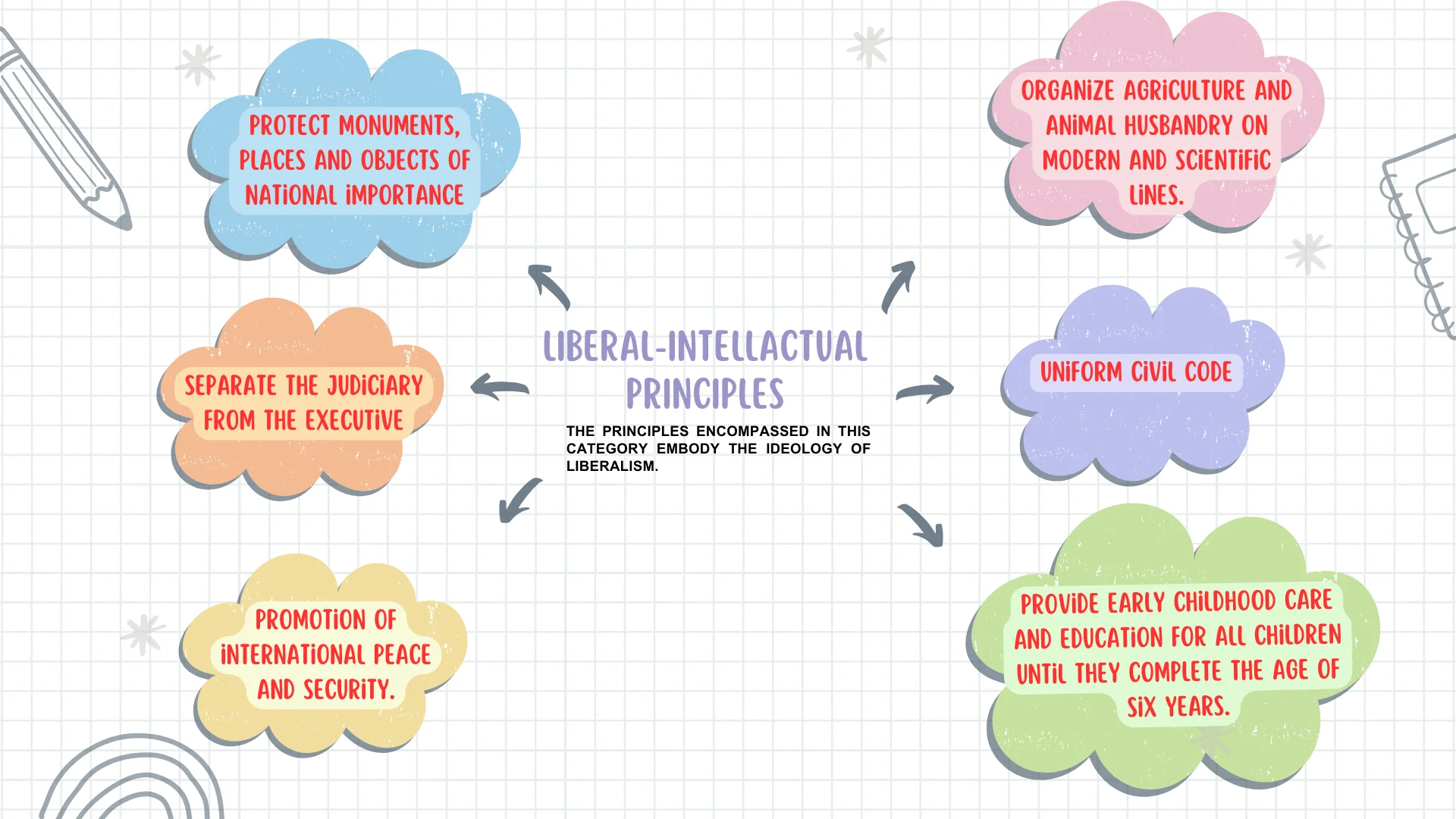
Enroll now for UPSC Online Course
| Must Read | |
| Current Affairs | Editorial Analysis |
| Upsc Notes | Upsc Blogs |
| NCERT Notes | Free Main Answer Writing |
Conclusion
The Indian Constitution aims to balance the powers and responsibilities of the Central and State governments, promoting cooperation and effective administration.
- While challenges like coordination and accountability persist, ongoing efforts to enhance collaboration and innovation reflect a commitment to improving governance.
- Through these mechanisms, India strives for a unified yet flexible federal system that benefits all citizens.
Sign up for the PWOnlyIAS Online Course by Physics Wallah and start your journey to IAS success today!
| Related Articles | |
| Centre State Administrative Relations (Articles 256-263) in India | Features of Indian Constitution |
| UPSC Indian Forest Service Examination | Federalism |

 GS Foundation
GS Foundation Optional Course
Optional Course Combo Courses
Combo Courses Degree Program
Degree Program









